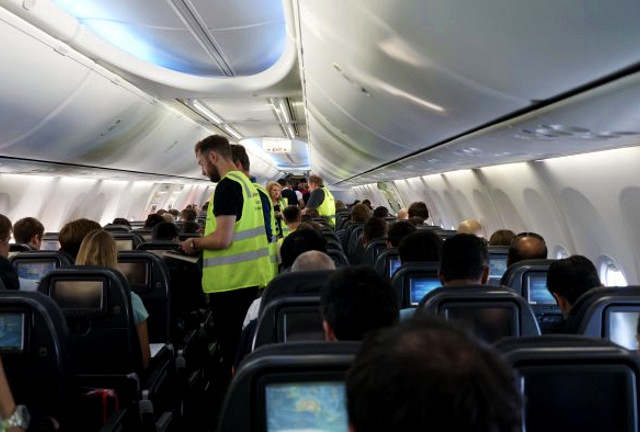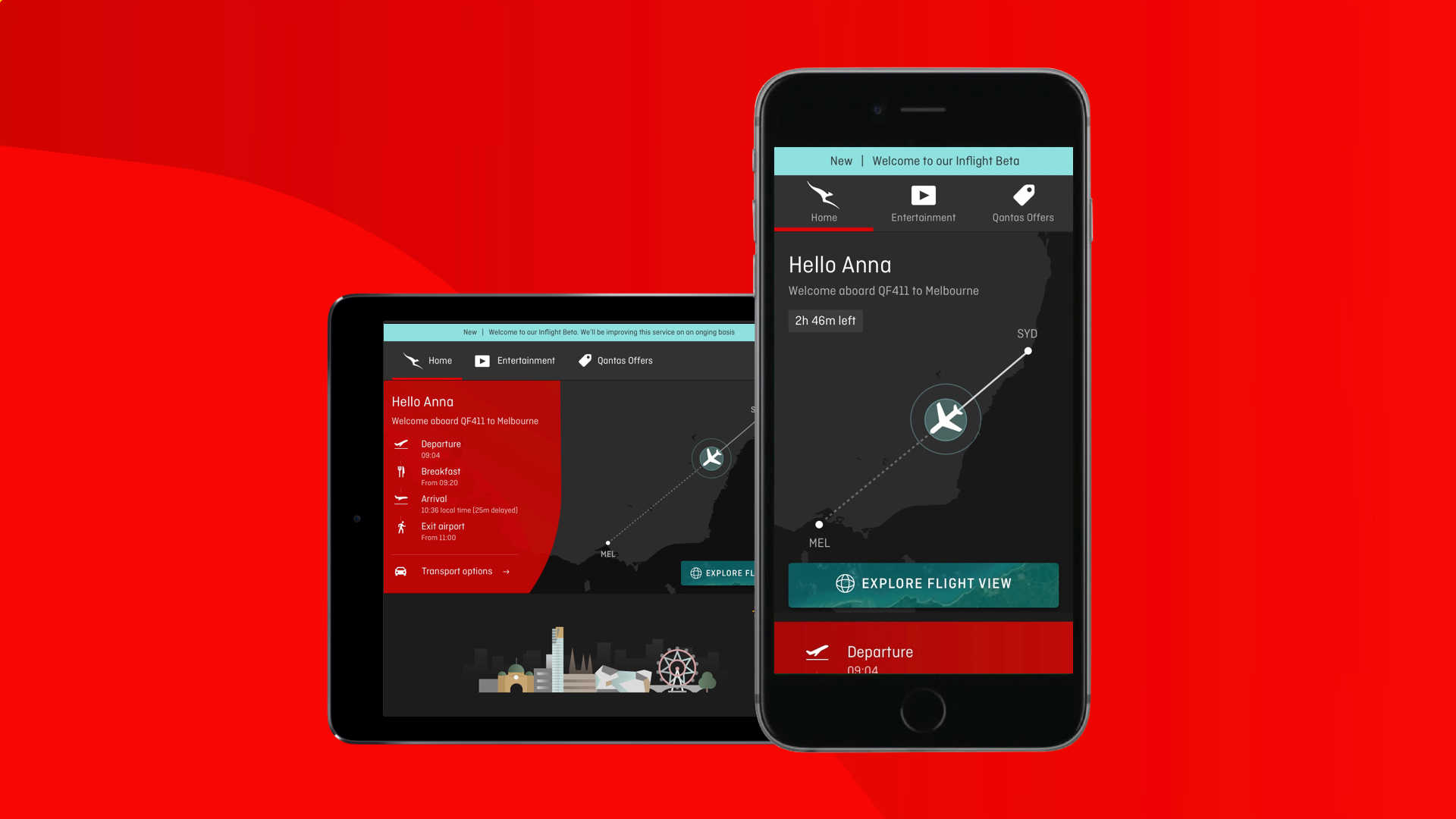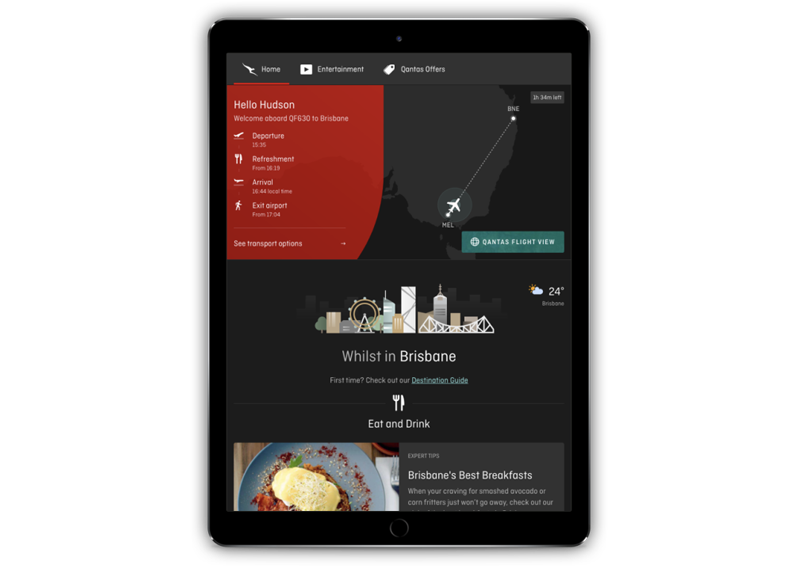
It might seem like Australia is behind the times without in flight wifi, however it was actually tested extensively with customers a few years ago and didn't receive enough interest.
This time around, we tested with stacks of customers in labs, flights, airports and lounges around Australia, and took the opportunity to really pinpoint customers' previous concerns and their needs. We discovered what customers are most excited to use in flight connectivity for, and we built it.
This is our innovation lab, littered with experiments, maps and sketches!

Because inflight wifi is a new technology in Australia that will spur a big user behaviour change, I wanted to make sure we validated the product perfectly with lots of testing.
I did formal testing in labs every sprint, plus guerilla testing every few days! I went to the airport, the Qantas lounges and regularly boarded domestic flights to test prototypes in-situ.

This product had a lot of streaming entertainment partners involved, who I collaborated with to work out how we would host streaming memberships within the inflight product.
I mostly collaborated with Spotify and Foxtel to design their portion of the web app and app experiences, creating UX and visual mocks for feedback and approvals.

I'm really proud of the key themes I pulled out of this user research. For example, I advocated for the customers need for a streamlined travel experience, free of all the current disruptions.
I identified events that customers found 'disruptive', such as losing connectivity on a flight, needing to ask cabin crew for assistance, receiving food, arriving in a new city without local knowledge, and trying to find your way around the airport - and then redesigned this entire experience to be seamless, yet attentive.

I was designing and prototyping in progressing fidelities every day on this project (using Sketch, Marvel and Axure).
I borrowed a leaf out of Nordstrom's book and did a whole lot of guerilla testing on this project. I went out to customers with anything from card sorts, to paper sketches, and even sketched on the fly while talking to customers.
We ended up with a mammoth amount of information and insights from real customers.

The project went on for about six months before the product was made public and the technology available on test flights, aka 'the labs'.
It was exciting to be part of the enormous engineering feat of putting satellites on planes. I had a whole new set of parameters to take into account as designer, such as not being able to add anything of 'weight' to the flight, and deciding what part of the application should be stored locally on a server on the plane.






It might seem like Australia is behind the times without in flight wifi, however it was actually tested extensively with customers a few years ago and didn't receive enough interest.
This time around, we tested with stacks of customers in labs, flights, airports and lounges around Australia, and took the opportunity to really pinpoint customers' previous concerns and their needs. We discovered what customers are most excited to use in flight connectivity for, and we built it.
This is our innovation lab, littered with experiments, maps and sketches!
Because inflight wifi is a new technology in Australia that will spur a big user behaviour change, I wanted to make sure we validated the product perfectly with lots of testing.
I did formal testing in labs every sprint, plus guerilla testing every few days! I went to the airport, the Qantas lounges and regularly boarded domestic flights to test prototypes in-situ.
This product had a lot of streaming entertainment partners involved, who I collaborated with to work out how we would host streaming memberships within the inflight product.
I mostly collaborated with Spotify and Foxtel to design their portion of the web app and app experiences, creating UX and visual mocks for feedback and approvals.
I'm really proud of the key themes I pulled out of this user research. For example, I advocated for the customers need for a streamlined travel experience, free of all the current disruptions.
I identified events that customers found 'disruptive', such as losing connectivity on a flight, needing to ask cabin crew for assistance, receiving food, arriving in a new city without local knowledge, and trying to find your way around the airport - and then redesigned this entire experience to be seamless, yet attentive.
I was designing and prototyping in progressing fidelities every day on this project (using Sketch, Marvel and Axure).
I borrowed a leaf out of Nordstrom's book and did a whole lot of guerilla testing on this project. I went out to customers with anything from card sorts, to paper sketches, and even sketched on the fly while talking to customers.
We ended up with a mammoth amount of information and insights from real customers.
The project went on for about six months before the product was made public and the technology available on test flights, aka 'the labs'.
It was exciting to be part of the enormous engineering feat of putting satellites on planes. I had a whole new set of parameters to take into account as designer, such as not being able to add anything of 'weight' to the flight, and deciding what part of the application should be stored locally on a server on the plane.
